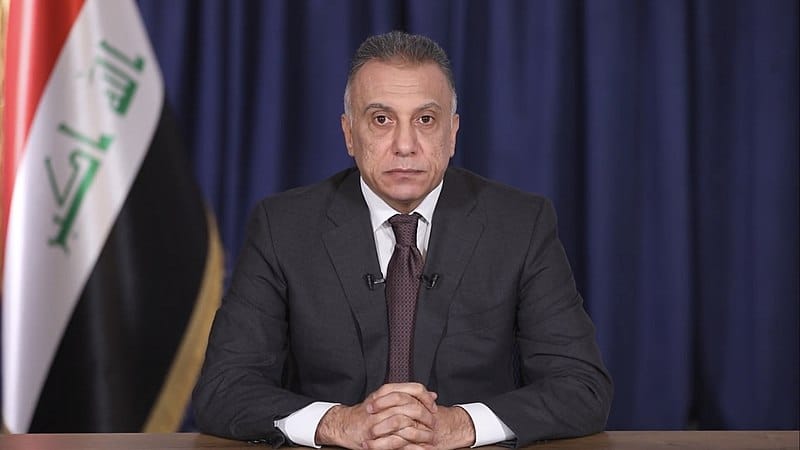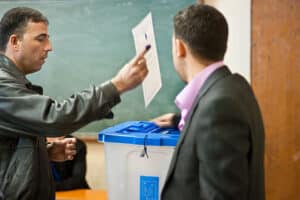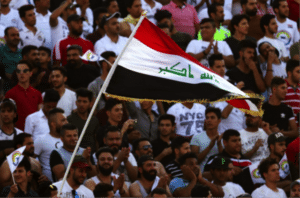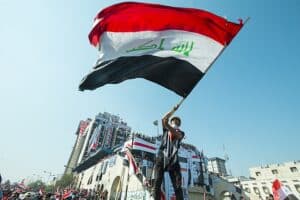Prime Minister Mustafa al-Kadhimi announced early parliamentary elections for the 6th of June 2021. The parliament was supposed to meet to discuss the polls, but an extraordinary session didn’t take place. The parliament is faced with the challenge of approving a new electoral law, which is a point of contention between the political blocs.
Amendment to the Election Law
In December 2019, the parliament approved an amendment to the Election Law. Namely, the new election law allows voters to elect individual legislators instead of choosing from a party list and have each member of parliament represent a specific electoral district instead of groups of legislators representing entire provinces. Since parliamentary blocks disputed over the nature and number of electoral districts, the amendment was not referred to the presidency of the republic for ratification.
New elections
President Barham Salihheld held a meeting with the incumbent PM Kadhimi and former PM Haidar al-Abadi to discuss the polls. Officials involved highlighted the importance of holding the elections in secure conditions and limiting the possession of weapons in the hands of the state.
For early elections to take place following conditions have to be fulfilled: the completion of the Election Law legislation, the restructuring of the Independent High Electoral Commission, the conclusion of the quorum of the Federal Court, and the provision of an appropriate security environment.
Completion of the Election law remains the most significant obstacle since some political parties want that each province is divided into two electoral districts, not several ones, to ensure that their candidates retain power. Also, Kurds believe that the election taking place in contested areas* will not guarantee them fair representation.
Concerning the Electoral Commission, parliament ended the work of the previous one, laying off thousands of staff members. The parliament also voted for forming a new commission which led to significant objections about the new offices of the commission amid demands to replace dozens of local directors in the governorates.
The Federal Court, which is responsible for ratifying elections results, lacks the legal quorum that is necessary to issue legal decisions due to disagreements between the court and the Judiciary Council. The only way for this debate to be settled is by defining new parliamentary legislation determining the needed mechanism for achieving a quorum in the Federal Court.
Lastly establishing a safe environment seems elusive, taking into account the ongoing kidnappings, assassinations and attacks at government headquarters and diplomatic missions.
Shiite cleric Muqtada al-Sadr supported the new Electoral law as a step in the right direction, and agreed on early elections. Grand Ayatollah Ali al-Sistani, the country’s most powerful religious authority, also expressed his support adding that a new election law that would restore public confidence in the system. However, most Kurdish and some Sunni Arab legislators boycotted changes to law as well as holding an early elections.
Protests
Last year protests that died down due to the coronavirus pandemic are now renewed. In October people protested demanding early elections, changes to the electoral system, and introduction of a fairer process in which new parties could be represented. The power in Iraq has been shared along ethno-sectarian lines since 2003. Thus the position of prime minister is held by a Shia Arab, the speaker of parliament by a Sunni Arab and the presidency by a Kurd. Beyond constitutional changes, protestors demanded the removal of the entire ruling elite as well as corruption trials for some political leaders. They called for the appointment of new governors, ministers, and senior officials, including a shift in foreign policy on Iran and the US.
Currently, protests are driven by a lack of services and electricity. Due to the implosion of oil prices as a result of the coronavirus pandemic government had to impose austerity measures which could also give rise to renewed demonstrations. However, people are still mainly protesting against corruption, lack of jobs, and poor public services.
Kadhimi has promised a dialogue with protestors and requested a list of all those who have been killed and injured during protests in a bid to bring about accountability and compensation.
Even though parliament didn’t meet to discus the polls, President Salihheld urged parliament to ratify a date for an early election, stressing how necessary they are for political reform.
*Kirkuk, Sinjar and Tuz Khurmatu
Sources: Aljazeera 1, Aljazeera 2, Arab News, MEE, Al-Monitor, ECFR, Reuters
Photo: Wikimedia Commons



